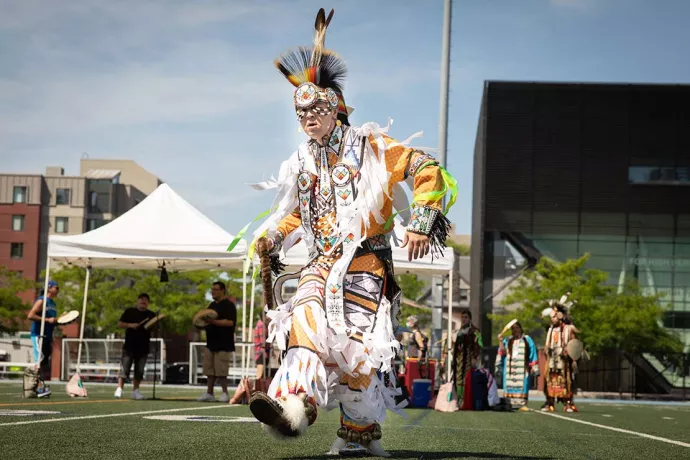
Recognizing Indigenous History Month
To the UTM community,
June 1 marks the start of National Indigenous History Month, recognized annually as an opportunity to honour the diverse cultures and contributions of First Nations, Métis, and Inuit people; to understand the colonial conditions for historical and ongoing inequities; and to affirm a collective commitment to truth, reconciliation and good kinship.
This commitment represents a core value for the University of Toronto Mississauga. Our campus runs alongside the Missinnihe, the trusting creek—called the Credit River by French and British colonists who, at the river’s mouth, traded goods on credit with Indigenous peoples, who had travelled and stewarded these waters from time immemorial. This land falls under the provisions expressed in Treaty 13-A, accepted reluctantly by Chiefs Chechalk, Quenepenon, Wabukanye and Okamapenesse in 1805, after an informed debate at the Mississaugas’ Council of Fire earlier that year.
Centuries later, UTM retains a connection to this legacy, which we aim to express in an intentional commitment to Mississauga’s place and its people: to build a trust that befits the trusting creek; to acknowledge the living histories that animate the land on which we work; and to strengthen a community based in respect, responsibility, relevance and reciprocity. This community, I hope, will centre perspectives and experiences of the Mississaugas of the Credit First Nation, to whom UTM owes a special gratitude for their continued friendship.
Our commitment to right relations involves a frank recognition of the historical and present trauma created by Canadian settler colonialism, most recently brought into focus by the triggering news from Tk’emlúps te Secwépemc territory, where the remains of 215 Indigenous children were discovered on the grounds of Kamloops Residential School. At a recent townhall, as we mourned the children’s deaths, I also urged our community to confront the truth. The Canadian system of residential schools took more than 150,000 Indigenous children from their families and strove to destroy their cultures, their languages and their identities. The effects of this system persist today in pervasive structures of inequality and in the intergenerational trauma that many Indigenous families continue to experience.
This truth entails a responsibility to action. As I noted in my video for Indigenous History Month, we have an established roadmap for change, with initiatives rooted in the Calls to Justice of the Final Report of the National Inquiry into Missing and Murdered Indigenous Women and Girls and in the Calls to Action of U of T’s response to the Truth and Reconciliation Commission: “Answering the Call: Wecheehetowin.” As that title suggests, and as President Gertler affirmed in his statement, U of T has a clear mandate and plan, focused on calls in thirty-four areas: the trust and history embedded in this land means that we must continue to answer.
In the spirit of action, I encourage you to mark this month by participating in events at UTM’s Indigenous Centre and U of T’s Office of Indigenous Initiatives; by reviewing our institutional and national commitments to reconciliation; by reading histories published by MCFN and other Indigenous peoples; and by accessing U of T’s programs in Indigenous Cultural Competency Training, with sessions including Speaking Our Truths: The Journey Towards Reconciliation (Part 1 and Part 2), Reconciliation: Walking the Path of Indigenous Allyship, and Reflecting on Land Acknowledgements. But I also encourage you to hold truth and reciprocity as values that matter urgently in every month—as part of what it means to work, learn and live here, on territory of the Wendat, the Seneca and the Mississaugas of the Credit First Nation, next to the trusting creek.
Thanks,
Alexandra Gillespie
Vice-President and Principal
University of Toronto Mississauga
Resources & Supports
